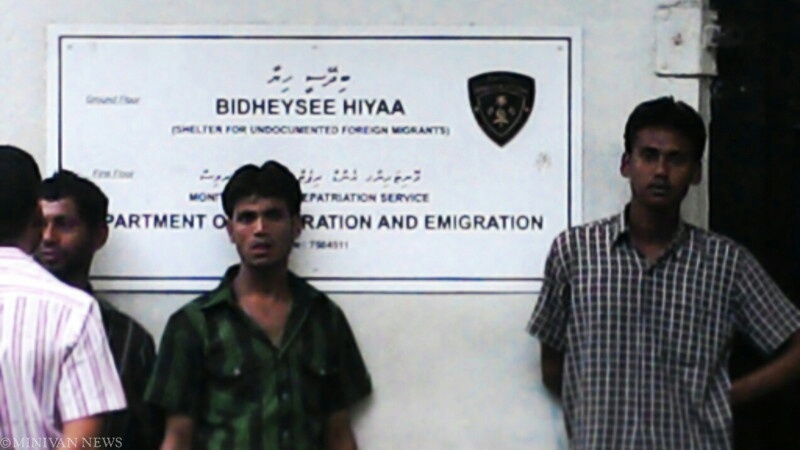A senior Indian diplomatic official in the Maldives has expressed concern over the ongoing practice of confiscating passports of migrant workers arriving to the country from across South Asia – likening the practice to slavery.
The diplomatic source, who wished not to be identified, has told Minivan News that although several government ministries were critical of the practice of withholding the passports of foreign staff coming to work in the country, the state had taken no action.
Some Ministries – such as the Education Ministry – themselves routinely confiscate passports of migrant workers.
“I’ve not met a single government minister who says that such a system [withholding passports] is legal,” the source said, claiming that they had seen little “real progress” from authorities in trying to address these concerns over the last 10 months.
The Maldives has come under strong criticism internationally in recent years over its record in trying to prevent people trafficking, with the country appearing on the US State Department’s Tier Two Watch List for Human Trafficking three years in a row.
In the report, the Maldives is mainly flagged as a destination country for victims of labour exploitation, particularly from Bangladesh and to a lesser extent, India, but was also noted as a destination for sex trafficking.
“An unknown number of the 80,000 to 110,000 foreign workers that government officials estimate are currently working in Maldives – primarily in the construction and service sectors – face conditions indicative of forced labour: fraudulent recruitment, confiscation of identity and travel documents, withholding or nonpayment of wages, or debt bondage,” the 2012 report notes.
According to the source within the Indian High Commission, by impinging on a person’s right of movement – such as by taking their right to travel freely between different countries – migrant workers without passports were essentially being subjected to “slavery” in the Maldives.
“Slavery is of course not permitted under Islam, but this system also incurs cost for the Maldivian people,” the source claimed, pointing to the rising costs of trying to attract skilled workers such as teachers to the country, when compared to other countries like Sri Lanka.
According to the High Commission, Indian workers experienced similar treatment with regard to their passports being withheld when they first began migrating to nations within the Organisation of the Petroleum Exporting Countries (OPEC) in the 1970’s and 1980’s.
“This was at a time when there was not much opportunity for work for skilled Indian workers,” he said. “However, now they have the choice of where to work and conditions have greatly improved.”
The diplomatic source said that countries such as Saudi Arabia had moved away from keeping the passports of migrant workers, as well as ensuring improved working conditions so they could attract the best staff for positions.
From the perspective of the Maldives, the high commission representative likened the attitude of many of the country’s employers towards hiring foreign staff as being synonymous with “ownership”, something he said did not reflect the critical need for foreign workers in the Maldives – both skilled and unskilled.
“If you are giving visas to these people then they are obviously needed. But if you need something you must also value it. Should you buy a expensive piece of electronic equipment, you would not go throwing it around and treating it badly,” the source suggested.
Contacted about the passport issue, Abdul Razak Ibrahim, Director General for the Ministry of Human Resources, Youth, and Sport, forwarded enquiries to the Department of Immigration and Emigration, which he said now dealt with employment issues.
Both Immigration Controller Dr Mohamed Ali and Deputy Controller Ibrahim Ashraf were not responding to calls from Minivan News at time of press.
Indian concerns
The issue of retaining passports is one of a number of concerns about the wider treatment of migrant workers from India and the South Asia region in the Maldives.
Earlier this year, the High Commissioner of Bangladesh in Male’, Rear Admiral Abu Saeed Mohamed Abdul Awal, questioned the treatment of workers from the country, who he said were regularly being brought to the Maldives to perform unskilled work, usually in the construction industry. Awal alleged that upon arriving, expatriates from Bangladesh were suffering from the practices of “bad employers”.
“This is a real problem that is happening here, there have been many raids over the last year on unskilled [expatriate] workers who are suffering because of the companies employing them. They are not being given proper salaries and are paying the price for some of these employers,” he said.
Rear Admiral Awar added that it was the responsibility of employers to ensure expatriate staff had the proper documentation and suitable living standards.
Concerns about the treatment of expatriates from across the South Asia region were also shared by Indian High Commissioner Dynaneshwar Mulay. Speaking to Minivan News, Mulay has previously raised concerns over the general treatment of Indian expatriates in the Maldives, particularly by the country’s police and judiciary.
Mulay claimed that alongside concerns about the treatment of some Indian expatriates in relation to the law, there were significant issues relating to “basic human rights” that needed to be addressed concerning expatriates from countries including Sri Lanka and Bangladesh.
Likes (0)Dislikes
(0)Dislikes (0)
(0) 
